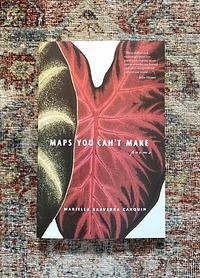Take a photo of a barcode or cover
medium-paced
Maps You Can’t Make by Marielle Saavedra Carquin (published by June Road Press in 2023) is a remarkable collection of poems. Saavedra Carquin writes with tender attention to the landscape of traumatic loss. Her voice is lyrical, strong, courageous. The opening poem, “Trance,” signals the volume’s source and trajectory: “after trauma/ you walk with your eyes/ dead-like in a forward direction.” The trauma has happened; we are already in it. And so these poems walk forward into danger, displacement, disappointment, damage. Because the poet has no choice: “we run in burning sands/ from things that some of us/ can’t just outrun.” In her preface, Saavedra Carquin wrote: “I want to redefine the cuts and edges trauma makes around the borders of a life. I want to find my way through the landscapes loss reshapes.” And she does this, brilliantly.
The book is organized into three sections. In the first, “Borderlines,” the speaker repeatedly finds her progress impeded: “I can’t move and I/ can’t leave/ just yet”; “don’t know how to make it go away/ don’t know how to run away”; “and you ran for the door/ you couldn’t open.” Numerous questions then run through the poems until, in the final stanza of the last poem, we read: “you ask yourself the same questions/ which become/ hauntings/ hauntings.” These hauntings then hang over the two sections that follow.
“Lost Ground,” the middle section, digs into raw places of abuse and abandonment and sadness. Many of the poems here are framed as emerging from dreams (worries, longings) and all are marked by the haunting first lines of the initial poem: “there is no fantasy left/ I locked it away when/ words stopped coming/ when there was no warmth / anymore/ when I stopped asking questions.” In these poems, the questions have given way to reflections on connection and disconnection between
self and other and on the tensions between a desire for grounding and the danger of entrapment and disappearance. In the last poems, the “I” takes possession of her wanting and her breath and extricates herself from quicksand: “sprinting upward:/ here I go in the direction of the sky.”
It is this emergence that launches the volume’s gorgeous closing section, “Braided Streams,” elegiac poems focused on the death of the mother. Here the poet reflects unflinchingly on loss and grieving (“I don’t know how/ to make the bleeding/ stop”), on time (“this is how time works/ it moves/ it moves/ all the time”), and on memory (“I miss when things weren’t memories yet”). The final five poems in this stunningly beautiful book—bearing the gift of braided streams, cradlings and re-rootings—simply took my breath away.
emotional
medium-paced
“was the tragedy in the leaving
or in the arriving?”
or in the arriving?”
emotional
reflective
medium-paced

